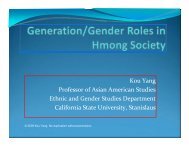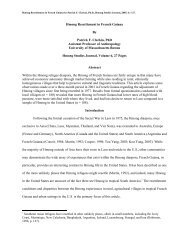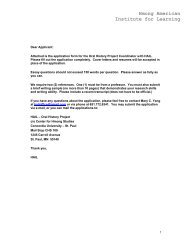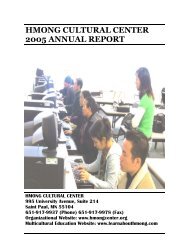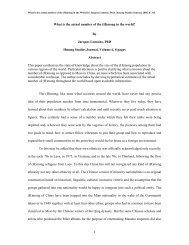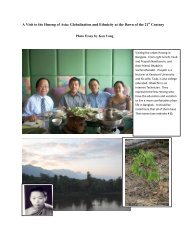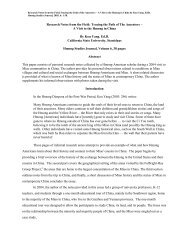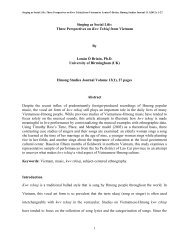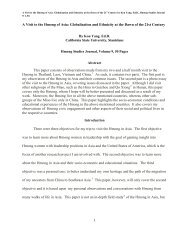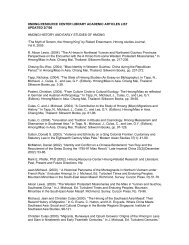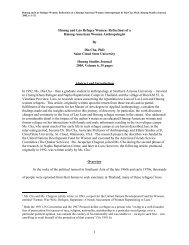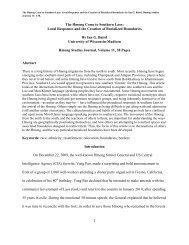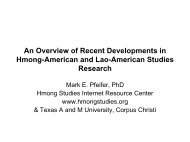Mark Pfeifer returns to St. Paul - Hmong Studies Internet Resource ...
Mark Pfeifer returns to St. Paul - Hmong Studies Internet Resource ...
Mark Pfeifer returns to St. Paul - Hmong Studies Internet Resource ...
You also want an ePaper? Increase the reach of your titles
YUMPU automatically turns print PDFs into web optimized ePapers that Google loves.
Asian American <strong>St</strong>udies, Education, <strong>Hmong</strong>, Library, Social Issues<br />
<strong>Mark</strong> <strong>Pfeifer</strong> <strong>returns</strong> <strong>to</strong> <strong>St</strong>. <strong>Paul</strong><br />
0 Comments 25 November 2011<br />
<strong>Mark</strong> E. <strong>Pfeifer</strong>, Ph.D.<br />
AAP staff report<br />
ST. PAUL (Nov. 19, 2011) — <strong>Mark</strong> E. <strong>Pfeifer</strong>, Ph.D. has returned <strong>to</strong> the Twin Cities <strong>to</strong> become<br />
the Direc<strong>to</strong>r of Research and Evaluation at <strong>Hmong</strong> American Partnership and its subsidiary<br />
<strong>Hmong</strong> National Development.<br />
“We are very pleased <strong>to</strong> have Dr. <strong>Mark</strong> <strong>Pfeifer</strong> on board at HAP and HND,” said President and<br />
CEO Bao Vang. “He will help us strengthen and increase the impact of our programs through the<br />
collection and analysis of research and evaluation data. He will also help us build our<br />
connections <strong>to</strong> the local and national research community for the purposes of partnering on<br />
studies <strong>to</strong> improve the lives of <strong>Hmong</strong> in Minnesota and across the U.S. while providing<br />
information <strong>to</strong> leaders and policy makers on emerging community trends and needs.”<br />
Many people remember Dr. <strong>Pfeifer</strong> from his role as direc<strong>to</strong>r of the <strong>Hmong</strong> <strong>Resource</strong> Center<br />
Library at the <strong>Hmong</strong> Cultural Center in Saint <strong>Paul</strong> from 2000 <strong>to</strong> 2006. For the past five years<br />
<strong>Pfeifer</strong> has served as an academic librarian at Texas A and M University at Corpus Christi.<br />
Over the past several years, <strong>Pfeifer</strong> continued <strong>to</strong> assist HCC with website work, grantwriting and<br />
with obtaining new acquisitions for the library. “So, it was never like I was completely removed<br />
from the community,” he added.<br />
<strong>Pfeifer</strong> describes his role at HAP and HND as helping <strong>to</strong> develop a new agency model with<br />
research-based data collection and analysis.<br />
“Other parts of my job include website development, working on grantwriting and grant reports<br />
for funders and overseeing program evaluation at the organization,” he said. “I am excited about
the new position and the opportunity it offers <strong>to</strong> work directly with the <strong>Hmong</strong> as well as the<br />
research community at the local and also the national level.”<br />
It’s good <strong>to</strong> be back, but <strong>Pfeifer</strong> said he recognizes an increasingly difficult challenge<br />
particularly for smaller <strong>Hmong</strong> non-profits. As Foundations have narrowed their funding focus<br />
with tighter budgets, he said that former <strong>Hmong</strong> refugees are relatively settled and support from<br />
the Office of Refugee Resettlement and others are moving on <strong>to</strong> other groups.<br />
“All <strong>Hmong</strong> non-profits are going <strong>to</strong> have find new fundraising models <strong>to</strong> be able <strong>to</strong> survive,” he<br />
said. “<strong>Hmong</strong> American Partnership is actively attempting <strong>to</strong> do this.”<br />
In terms of academic efforts, <strong>Pfeifer</strong> said there is a duplication of research, archives and other<br />
efforts. At the same time, he said there are limited resources available and it is his hope <strong>to</strong> bring<br />
existing resources <strong>to</strong>gether in a mutually beneficial way <strong>to</strong> improve access <strong>to</strong> funding resources.<br />
“This has been a real challenge for several years,” he added.<br />
<strong>Pfeifer</strong> will continue <strong>to</strong> serve as edi<strong>to</strong>r of the <strong>Hmong</strong> <strong>St</strong>udies Journal (www.hmongstudies.org).<br />
He would like <strong>to</strong> be even more active in presenting annual workshops with scholars who publish<br />
in the journal in partnership with <strong>Hmong</strong> American Partnership and <strong>Hmong</strong> National<br />
Development and area universities.<br />
As for his own research, <strong>Pfeifer</strong> is working on a comprehensive scholarly anthology of articles<br />
related <strong>to</strong> <strong>Hmong</strong> Americans with the University of Hawai‘i Press. He is the lead edi<strong>to</strong>r on this<br />
book project and said the project will make a major contribution <strong>to</strong> <strong>Hmong</strong> American <strong>St</strong>udies<br />
literature and should be published sometime next year.<br />
<strong>Pfeifer</strong> is also editing the new issue of the <strong>Hmong</strong> <strong>St</strong>udies Journal and hopes <strong>to</strong> publish Volume<br />
12 by the end of December 2011. For the first six months of 2012, <strong>Pfeifer</strong> will lead HAP and<br />
HND in working with Professor Chia Vang at UW-Milwaukee and other scholars on a 2010<br />
<strong>Hmong</strong> Census Report.<br />
“This report will provide a comprehensive analysis of <strong>Hmong</strong> American data from the census<br />
and the American Community Survey,” he said. “It will also discuss policy issues that emerge<br />
from the data and from community assessments that the two organizations have conducted with<br />
<strong>Hmong</strong> communities across the United <strong>St</strong>ates over the past year.”<br />
<strong>Pfeifer</strong> enjoyed his position with the Texas A and M university system. He could have remained<br />
at Corpus Christi after his five-year librarian tenure review with annual appointments. He<br />
enjoyed visiting and learning about different regions of the state, including the Southeast Asian<br />
communities in Hous<strong>to</strong>n, Dallas and Austin.<br />
“I liked working with the students and faculty,” he said. “I was also given a lot of freedom <strong>to</strong><br />
pursue my research interests.”
<strong>Pfeifer</strong> had a role in bringing more awareness of the <strong>Hmong</strong> American experience <strong>to</strong> the<br />
university through his research and connections. He said that few students or faculty had even<br />
heard of the <strong>Hmong</strong>, and so <strong>Pfeifer</strong> was called on <strong>to</strong> speak or answer questions about the <strong>Hmong</strong><br />
who have a very low visibility in Texas compared <strong>to</strong> Minnesota.<br />
“In the last few years that changed a little bit as I was asked <strong>to</strong> lecture and meet students in an<br />
East Asia His<strong>to</strong>ry class and a Social Psychology Class on campus at Texas A and M Corpus<br />
Christi,” he said. “During the past several years, I really valued the opportunity <strong>to</strong> go <strong>to</strong> events<br />
like the <strong>Hmong</strong> National Conference <strong>to</strong> share the work of the <strong>Hmong</strong> <strong>St</strong>udies Journal and meet<br />
students and community members. I think people residing in Minnesota take such opportunities<br />
for direct interaction a bit more for granted.”<br />
More recently he has served as a lecturer, teaching online Anthropology courses pertaining <strong>to</strong><br />
Cultural Diversity for the <strong>St</strong>ate University of New York Institute of Technology in Utica.<br />
“I am continuing <strong>to</strong> teach these online courses for SUNY-IT,” <strong>Pfeifer</strong> said.<br />
A large part of his research is with the <strong>Hmong</strong> community and <strong>Pfeifer</strong> said he felt isolated form<br />
that and his family is also in Wisconsin. “Believe it or not, I really did not care for the very hot<br />
and humid climate, I developed allergies down there that I had never had up north so I am<br />
actually quite pleased <strong>to</strong> be away from the warm, coastal climate.”<br />
While in Texas <strong>Pfeifer</strong> enjoyed <strong>to</strong>uring cities, visiting other universities and trying out the local<br />
ethnic cuisine in each place whether Southeast Asian or Mexican.<br />
“I enjoy traveling and trying different restaurants, especially those featuring ethnic cuisines,”<br />
said <strong>Pfeifer</strong>. “I will miss the BBQ, Tex-Mex and Southern Cuisine in Texas, but am looking<br />
forward <strong>to</strong> visiting all of the new places in <strong>Hmong</strong> Village and other locations in Saint <strong>Paul</strong>!”<br />
<strong>Pfeifer</strong>’s lifelong fascination with radio may surprise people. He has recorded hundreds of hours<br />
from radio stations in Wisconsin and around the country since the early 1980s.<br />
For the past two-years, <strong>Pfeifer</strong> has set up a webpage devoted <strong>to</strong> his “aircheck collection”,<br />
perhaps the largest collection of Milwaukee and <strong>St</strong>. Louis radio airchecks online at<br />
www.mostlyuppermidwestairchecks.com. It is also linked <strong>to</strong> YouTube and Facebook.<br />
“The webpage has received a lot of positive feedback from radio fans around the country who<br />
enjoy listening <strong>to</strong> clips of radio stations from many years ago,” said <strong>Pfeifer</strong>. “A few months ago,<br />
I finished transferring my cassette collection <strong>to</strong> MP3 files and <strong>to</strong> the web so I may need <strong>to</strong> find<br />
another hobby now.”<br />
Contact Dr. <strong>Pfeifer</strong> at 651-495-1517 or email markp@hmong.org.



